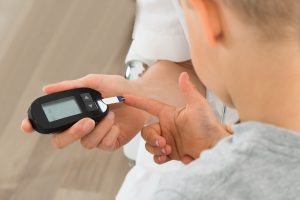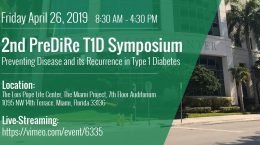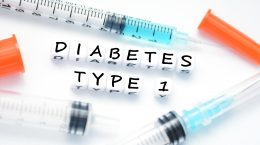Published on November 13, 2022
Today, World Diabetes Day, we are excited to offer home blood spot testing for T1D autoantibodies as part of our next phase Type 1 Diabetes Prevention study
 Evidence suggests a role of vitamin D and omega-3s in possibly reversing or stopping progression from developing type 1 diabetes (T1D) autoantibodies to a T1D diagnosis. Our Type 1 Diabetes Prevention Project began enrolling participants in the summer of 2018, offering vitamin D and omega-3 testing and education while relying on T1D autoantibody status from outside sources.
Evidence suggests a role of vitamin D and omega-3s in possibly reversing or stopping progression from developing type 1 diabetes (T1D) autoantibodies to a T1D diagnosis. Our Type 1 Diabetes Prevention Project began enrolling participants in the summer of 2018, offering vitamin D and omega-3 testing and education while relying on T1D autoantibody status from outside sources.
We are excited to begin offering home blood spot testing for the four main T1D autoantibodies as part of the next phase of this project! As part of this project, participants can test for the presence of
- Anti-Insulin (also known as mIAA or IAA)
- Anti-IA2 (IA-2A)
- Anti-GAD65 (GAD65 or GADA)
- Anti-ZnT8 (ZnT8)
If you are interested in joining this project to measure these T1D autoantibodies for yourself or your child, please let us know!
Complete this short contact form, and a study coordinator will be in touch with you.
What Are T1D Autoantibodies, and How do They Relate to a T1D Diagnosis?
Autoantibodies are antibodies created by a person’s immune system that attack proteins in their own cells, as seen in many autoimmune diseases. The presence of the T1D islet cell autoantibodies above indicates an autoimmune response against the cells of the pancreas, and is strongly associated with the development of T1D; the detection of these autoantibodies can be used as markers of the process that can cause type 1 diabetes. According to the American Diabetes Association, the presence of two or more of these autoantibodies in the blood, but with normal blood glucose levels, defines Stage 1 Type 1 Diabetes. **This does not mean that a person with two or more of these autoantibodies in fact has Type 1 Diabetes**
The presence of autoantibodies can change over time, and can be influenced by factors such as the status of the body’s immune system and levels of inflammation. Improved vitamin D and omega-3 status, as well as decreased inflammation, have been associated with lower levels of these autoantibodies and therefore lower risk of T1D development.
If you or someone you know has tested positive for T1D autoantibodies in the past, and have not yet been diagnosed with T1D, follow-up testing for both autoantibodies and vitamin D and omega-3 status is highly recommended. Your data is especially valuable to this project, and we encourage you to enroll today.
If you are interested in joining this project to measure these T1D autoantibodies for yourself or your child, please let us know! Complete this short form, and a study coordinator will be in touch with you.
Complete the Interest Form Here
Who is at Risk of Developing T1D?
Family history of T1D is an indicator of T1D risk, however, other factors are associated with the development and progression of T1D, such as inflammation, autoantibody status, vitamin D3 deficiency, even viral infection.
Symptoms of Type 1 Diabetes
Keep in mind the symptoms of type 1 diabetes, which include frequent urination, thirst, lack of energy, and nausea. Regular blood glucose monitoring is suggested for those experiencing these symptoms.
Type 1 Diabetes Prevention Study Project Goal
The goal of this open source study is to learn if taking omega-3 and vitamin D3 supplements in order to achieve minimum target blood levels of one or both can delay or prevent T1D in those who have tested positive for one or more of the T1D autoantibodies, now or in the past. Other measurements included in the testing and analysis for this study are hsCRP (a measure of inflammation) and HbA1c (a measure of blood sugar health, included as a cautionary measure). We hope to eventually publish these results, and those who participate in this effort are greatly appreciated — you are helping find the answer!
We hypothesize that getting to an optimal AA:EPA Ratio and an optimal vitamin D level [measured as 25(OH)D] may assist in slowing progression towards T1D, even for those who test positive for one or more autoantibody. Your time and effort in answering the online questions and participating in the blood spot testing is instrumental in this prevention effort.
Are You Interested in Participating?
If you are interested in joining this project to measure these nutrient levels and other markers, including T1D autoantibodies, for yourself or your child, please let us know! Complete this short form, and a study coordinator will be in touch with you.
Complete the Interest Form Here
Are You Interested in Sponsoring a Participant?
The fees associated with the testing in this program (3 test kits over a span of approximately 18 months, at a cost of $315 plus shipping per kit) may not be affordable for everyone interested, and we highly encourage donations to help sponsor participation. Can you sponsor a qualifying participant in the study? Even sponsoring a single test kit could make a big difference for someone at risk.
Are Your Nutrient Levels OK?
 Having and maintaining healthy vitamin D levels and other nutrient levels can help improve your health now and for your future. Choose which to measure, such as your vitamin D, omega-3s, and essential minerals including magnesium and zinc, by creating your custom home test kit today. Take steps to improve the status of each of these measurements to benefit your overall health. You can also track your own intakes, symptoms and results to see what works best for YOU.
Having and maintaining healthy vitamin D levels and other nutrient levels can help improve your health now and for your future. Choose which to measure, such as your vitamin D, omega-3s, and essential minerals including magnesium and zinc, by creating your custom home test kit today. Take steps to improve the status of each of these measurements to benefit your overall health. You can also track your own intakes, symptoms and results to see what works best for YOU.
Enroll and test your levels today, learn what steps to take to improve your status of vitamin D (see below) and other nutrients and blood markers, and take action! By enrolling in the GrassrootsHealth projects, you are not only contributing valuable information to everyone, you are also gaining knowledge about how you could improve your own health through measuring and tracking your nutrient status, and educating yourself on how to improve it.





